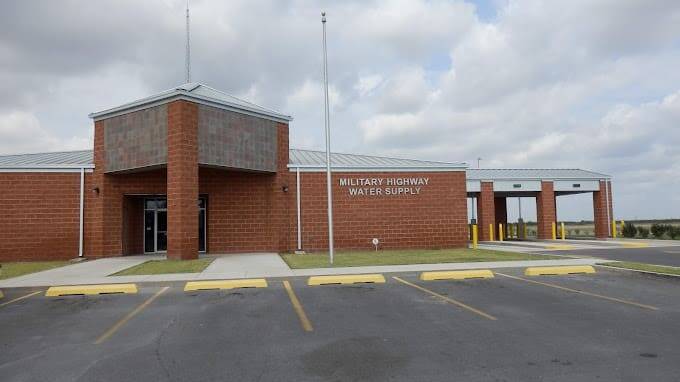In South Texas, the Military Highway Water Supply Corporation (MHWSC) delivers drinking water to more than 15,000 residents across over 50 colonias in southeastern Hidalgo and Cameron counties. Based in the small community of Relampago, between Mercedes and Progreso, MHWSC has been a steady presence since 1971. Under the leadership of General Manager Consuelo De La Rosa — who has served the utility for nearly 40 years — the organization remains deeply connected to the people it serves.
In early 2023, MHWSC completed a project to replace two aging ground storage tanks that ruptured during the devastating 2021 winter freeze. The tanks, more than two decades old, were overdue for replacement.
“With the new tanks, we’ve been able to serve the 1,800 families in our colonias with safe water and consistent pressure,” De La Rosa said. “That’s something we weren’t able to do before. We are now fully in compliance with the Texas Commission on Environmental Quality (TCEQ).”
The project was made possible through a fast-turnaround loan from Communities Unlimited (CU), the nation’s largest Community Development Financial Institution (CDFI) lender to rural water systems. CU’s Infrastructure Lending Program, with a 2-3 business day response time, provided the emergency financing needed.
“Having a funding institution that moves as quickly as CU means a lot to us, especially in an emergency.”
“When our tank at the Progreso Lake booster station ruptured, we lost the capacity to serve all of our customers from that site,” De La Rosa said. “CU stepped in with funding almost immediately. Without them, we would’ve had to scramble for a bank loan or try to fund it ourselves — and that tank couldn’t wait.”
Once materials arrived, construction moved quickly.
“The contractor installed each tank in just about two weeks,” De La Rosa said.

“Our customers are now benefiting directly from the upgrades,” she added. “We’re meeting TCEQ standards and delivering the service they deserve.”
That success laid the groundwork for more. As MHWSC looked ahead, it identified another need: the South Alamo area, near the Santa Ana Wildlife Refuge, where aging infrastructure again posed reliability risks. CU’s Community Infrastructure Team stepped in. Senior Environmental Management Consultant Oliver de la Garza helped MHWSC pursue a $500,000 grant from the North American Development Bank (NADBank) through its Community Assistance Program (CAP).
With Oliver’s assistance, MHWSC coordinated grant preparation, engineering documentation, and partner communications. In April 2024, the grant was awarded to fund two additional ground storage tanks in South Alamo. Though production delays pushed the timeline back, the tanks are now procured and under construction, with a revised target completion date of April 2025.
“Oliver has been checking in regularly and helping guide us to new funding sources."
“He’s been supportive, especially with these larger projects,” De La Rosa said. “We’ve now repaired or replaced six of our eight ground storage tanks thanks to support from CU and NADBank.”
MHWSC has also addressed broader infrastructure needs in Southern Cameron County. From June 2023 to May 2024, the utility secured $2.2 million in Economically Distressed Areas Program (EDAP) funding from the Texas Water Development Board (TWDB) — split evenly between grant and loan — for a waterline rehabilitation project in the Las Rusias area. The project includes replacing 11,000 feet of aging water lines to improve reliability and reduce arsenic levels. MHWSC has faced TCEQ penalties related to water quality, and CU has provided technical assistance, including engineering support and coordination of a required parity agreement. A second EDAP application was submitted in May 2024 to continue infrastructure improvements.
Still, the work is far from finished. The utility is seeking funding for a new mechanical wastewater treatment plant in the San Pedro area and preparing for a costly infrastructure relocation tied to a Texas Department of Transportation (TxDOT) highway expansion.
“Our infrastructure is deteriorating, and we’re trying to make every dollar stretch,” De La Rosa said.
The emergency loan that jumpstarted the tank replacements was backed by the CDFI Fund, which enables organizations like CU to serve as first responders when infrastructure fails. While traditional funding can take months or even years to process, CU’s model allows rural systems to bridge the gap between crisis and recovery.
“I’m very grateful for all the help we’ve received from Communities Unlimited,” De La Rosa said. “They’ve helped us with wells, tanks, and more. With their support, we’re able to keep moving forward.”

